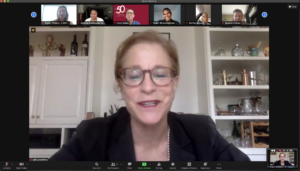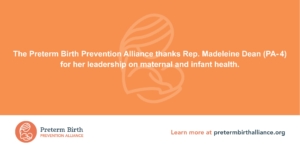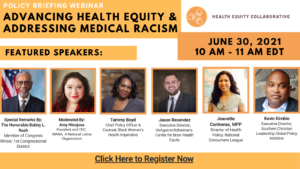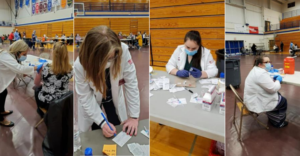 Preterm Birth Prevention Alliance
Preterm Birth Prevention Alliance
The Preterm Birth Prevention Alliance is excited to share that on August 18 the FDA granted AMAG/Covis’ request for a public hearing to review the proposed grounds for withdrawing 17P from the market. It is a great milestone for the Alliance. In the months leading up to the hearing, the Alliance will continue its advocacy on behalf of women at-risk for preterm birth, and meeting with policymakers across the Administration and in Congress to raise awareness of the upcoming hearing and the risks associated with potential withdrawal of 17P from the market.
On July 20, several members of the Alliance (including 1,000 Days, 2020 Mom, Black Mamas Matter Alliance, Expecting Health, HealthyWomen, Miracle Babies, National Consumers League, and National Partnership for Women & Families) had the opportunity to meet with the White House Domestic Policy Council to brief them on the issue and share our communities’ perspectives. We left this meeting encouraged by their receptivity and galvanized to continue this important work. At their recommendation, we will also be pursuing a meeting with Dr. Stephen Cha, Counselor to the Secretary of HHS, whose portfolio includes FDA issues.
Members of the Preterm Birth Prevention Alliance continued to advocate for the health of moms and babies at a meeting with Madeleine Dean’s office on July 29. During the meeting with Representative Dean’s staff, Alliance members discussed our efforts to preserve access to 17P. We are so encouraged to find an ally and champion of maternal health in Representative Dean, and look forward to continued engagement on this issue with her office. We want to give special thanks to National Partnership for Women & Families, American Association of Birth Centers, HealthyWomen, and 1,000 Days for their partnership in this effort.
Health equity
 On June 30, Jeanette Contreras, joined a panel focused on medical racism and health disparities. Jeanette highlighted NCL’s standing priorities in maternal health and women’s reproductive justice. She also lifted up NCL’s efforts to increase vaccine confidence and educate consumers about the role pharmacy benefit managers play in drug pricing. The Honorable Bobby L. Rush (IL-1) helped kickoff the event featuring other leading voices in the health equity space.
On June 30, Jeanette Contreras, joined a panel focused on medical racism and health disparities. Jeanette highlighted NCL’s standing priorities in maternal health and women’s reproductive justice. She also lifted up NCL’s efforts to increase vaccine confidence and educate consumers about the role pharmacy benefit managers play in drug pricing. The Honorable Bobby L. Rush (IL-1) helped kickoff the event featuring other leading voices in the health equity space.
To help boost NCL’s health equity priorities, Nissa Shaffi published blogs on the Model Minority Myth and addressing health inequities for LGBTQ communities, in honor of AAPI Heritage Month and Pride Month, respectively. The blogs focused on the need for data disaggregation among racial and ethnic communities and the disproportionate disease burden observed in the LGBTQ community.
On July 1, NCL intern, Spencer Cramer, published his first blog on how the nation needs to treat gun violence as a public health crisis. The piece advocated for investing in robust research and multiple solutions for gun violence as a holistic approach towards health equity.
Vaccines
On April 23, Jeanette Contreras testified before the emergency meeting of the CDC Advisory Committee on Immunization Practices (ACIP) to discuss updates on the recommendations to pause the Janssen COVID-19 vaccine. NCL commended the momentary pause in distribution of the vaccine enacted out of “an abundance of caution”, following the reports of severe cases of a rare form of blood clots observed in young women. It illustrated the agencies’ swift response to vaccine surveillance data. In July, NCL submitted written comments regarding the cases of Guillain-Barré syndrome (GBS) observed in patients who have received the Janssen vaccine. We are pleased the agencies resumed emergency use of the vaccine and encourage continued transparency.
Additionally, NCL submitted written comments to ACIP in support of an expedited recommendation for the newest class of pneumococcal vaccines, including for the already FDA-approved PCV20 vaccine. A prompt recommendation for this vaccine will ensure that seniors and vulnerable populations can receive needed protection from it as we come out of the COVID-19 pandemic.
NCL also had the opportunity to advocate for our youngest consumers, pediatric populations. On June 10, Nissa Shaffi testified before the Food and Drug Administration’s Vaccines and Related Biological Products Advisory Committee, about the ongoing rollout of COVID-19 vaccines for pediatric populations. The testimony highlighted priorities related to pediatric vaccine uptake and health disparities observed in pediatric COVID-19 cases. Separately, Jeanette Contreras submitted written testimony to ACIP on behalf of NCL and as a mother of two boys, ages 8 and 9, in support of granting emergency use authorization for the COVID-19 vaccine in pediatric populations. The absence of a vaccine for school-aged children will not only lead to continued transmission; as they return to school in the fall, we may see a spike in pediatric cases.
Script Your Future Medication Adherence Team Challenge
For ten years, Script Your Future teams have conducted community outreach, teaching patients to take their medications as directed by their providers. This year’s Team Challenge National Awards, announced in June, went to the University of Charleston School of Pharmacy (UCSOP) and the University of the Sciences, Philadelphia College of Pharmacy participating. Congratulations to all the teams who were awarded stipends for their participation in the Team Challenge!
Last year, we included vaccine confidence as a metric for the competition. We’re so excited to share that due to the inclusion of vaccine confidence in the Script Your Future campaign, this year’s teams collectively inoculated more than 134,000 patients against COVID-19 and other routine immunizations! Through their strategic and diligent patient outreach via mass vaccination sites, our teams made their communities safer, one interaction at a time, culminating in over 280,000 patient interactions, nationwide.
COVID-19
NCL continues to educate consumers on vaccine confidence during the COVID-19 pandemic. On May 19, Jeanette Contreras, published her second Spanish-language blog to educate consumers about the availability of at-home COVID tests and the role of testing in the continued response to the pandemic. On June 23, Nissa Shaffi, published a blog in support of CDC recommendations that COVID-19 vaccines are safe for pregnant and lactating persons. The blog explores vaccine hesitancy regarding maternal immunizations and serves as a call to action for everyday immunization advocates to encourage vaccine confidence in their communities.
On August 18, NCL released a statement in support of government and employer mandates requiring vaccination. Employer mandates are proving to be an effective measure to nudge reluctant people to get the COVID-19 vaccine. Additionally, vaccine mandates should be implemented in collaboration with labor unions, and provide workers with paid leave to get the vaccine and to potentially recover from side effects resulting from vaccination.
Prescription drug prices
NCL continues its efforts to educate consumers about the role PBMs play in the rising costs for prescription medications. On July 19, Sally Greenberg penned an op-ed, featured in the Morning Consult, on the need for swift implementation of regulations that would direct PBMs to pass along negotiated savings to consumers at the pharmacy counter.
On July 26, Sally Greenberg penned an *op-ed, featured in The Hill, on how a loophole in the ACA allows health plans to cover prescription drugs as an Essential Health Benefit (EHB), but not count a patient’s out-of-pocket costs toward reaching their annual deductible or out-of-pocket cost maximum. NCL calls on Congress to clarify that any service covered by a health plan is defined as an EHB, so patients’ out-of-pocket payments for Rx drugs are always counted towards their maximum requirement.
On June 30, NCL Executive Director, Sally Greenberg, moderated a panel on access to contraceptives as intended by the ACA. The panel featured experts in the women’s health space, as well as a patient who shared her personal testimony regarding contraceptive use.
CBD education and advocacy
On June 9, NCL released a statement expressing concerns with the Hemp Access and Consumer Safety Act (S. 1698), which mandates that the FDA regulate CBD as a dietary ingredient. This legislation would only further incentivize CBD manufacturers to seek fast-track approval as a dietary supplement and forego rigorous clinical trials needed for the development of FDA-approved medicines.
As a member of the Collaborative for CBD Science & Safety, NCL signed onto a joint statement on the release of the “Cannabis Administration & Opportunities Act” discussion draft as it impacts cannabinoid science and the regulation of CBD-containing products. NCL looks forward to engaging with policymakers to develop policy recommendations that ensure the quality and safety of CBD and CBD-containing products available for consumer use. During National Mental Health Awareness Month, the Consumers for Safe CBD campaign released a PSA featuring Jeanette Contreras, NCL Director of Health Policy, to warn consumers about turning to unregulated over-the-counter CBD products that claim to help ease anxiety and depression.
New resources on the PBM problem
NCL continues efforts to address the unfair disadvantage consumers face at pharmacy counters at the hands of pharmacy benefit managers, or PBMs. Our new webpage provides resources to further explain the complicated and obscure PBM system, including an explainer video and glossary of key terms to help consumers better understand this complex issue. As Congress returns from summer recess and healthcare legislation will be a top priority, we look forward to working with them to advocate for meaningful reforms to help lower consumer out-of-pocket costs. Please feel free to share these resources with your audiences and learn more at nclnet.org/pbms.
*Links are no longer active as the original sources have removed the content, sometimes due to federal website changes or restructurings.







 Preterm Birth Prevention Alliance
Preterm Birth Prevention Alliance
 On June 30, Jeanette Contreras, joined a panel focused on medical racism and health disparities. Jeanette highlighted NCL’s standing priorities in maternal health and women’s reproductive justice. She also lifted up NCL’s efforts to increase vaccine confidence and educate consumers about the role pharmacy benefit managers play in drug pricing. The Honorable Bobby L. Rush (IL-1) helped kickoff the event featuring other leading voices in the health equity space.
On June 30, Jeanette Contreras, joined a panel focused on medical racism and health disparities. Jeanette highlighted NCL’s standing priorities in maternal health and women’s reproductive justice. She also lifted up NCL’s efforts to increase vaccine confidence and educate consumers about the role pharmacy benefit managers play in drug pricing. The Honorable Bobby L. Rush (IL-1) helped kickoff the event featuring other leading voices in the health equity space.







